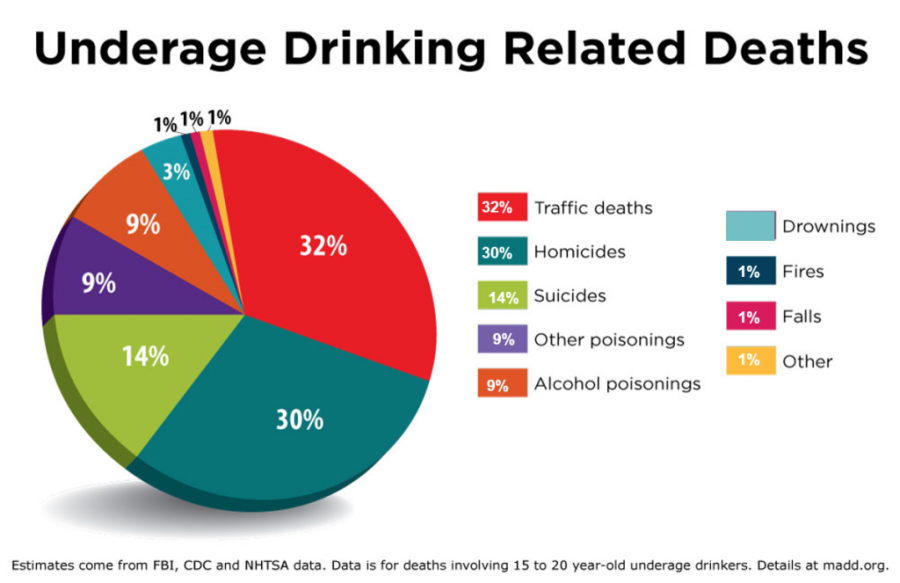Unloading the Issue of Underage Drinking
Underage drinking is an ongoing problem in our world
January 27, 2022
These past few years have been very difficult, to say the least. It might surprise you to hear that there has not been an increase in adolescent substance abuse during the Covid-19 pandemic. Annual studies have shown that alcohol consumption in teens has maintained a steady decline since 1998 and during 2020, these numbers hit a record time low. This could be due to a few reasons, two of which being that since students were at home during distance learning, they didn’t peer pressure at school or parties, and the other has simply to do with not having access. People were confined to their homes and stores were closed down, limiting access to substances such as alcohol and nicotine.
Just because numbers have gone down doesn’t mean this isn’t an important issue that needs to be addressed. Teen drinking is a problem experienced by many all across the U.S. Consuming alcohol under the age of 21 is against the law and extremely dangerous. Some people who binge drink might do so to escape certain emotions and experiences in their day-to-day lives. These kinds of people may not have much concern over their well-being. So to preach to teens that drinking alcohol is bad for your body in many ways might not be as effective as we have come to believe. Though studies have shown that throughout the course of the Covid-19 pandemic young adults and teens have better learned how to have empathy towards their peers. Perhaps being away from others like them for so long has made them value each other and their community more.
Being isolated in our homes for nearly all of 2020, and having to social distance and wear masks has taught people how to be more aware of and take more effort to keep those around them safe. Teen drinking is dangerous to the body, yes, but also to those around them. Drinking and driving is a common occurrence in the U.S. Drive Safely.Net says that 60% of all teen deaths from car accidents involve alcohol. As scary as that sounds, some people might not give that fact a second thought. But if you were to say that teen substance abuse affects your peers and friends, particularly their mental health, there might be a better chance of getting through to them.
During these past few years, mental health has been a topic highly discussed in school classrooms and communities. Society seems to be shining more and more light on this issue as the pandemic continues. Teens now especially are beginning to pay attention to, value, and make an effort to maintain a healthy mental space for both themselves and their peers. Knowing someone who has a drinking problem, whether you are close friends or not, can have a heavy effect on your mental health. Kim Louvin, a school social worker for Sam Barlow said this about those who see alcohol substance abuse among peers, “Their discomfort was not about alcohol specifically, but about the choices they were witnessing their friends make while under the influence. They were concerned about their friends being taken advantage of by others, embarrassing themselves, getting too drunk and having negative physical effects, or getting into a car with someone who wasn’t sober.” If more people spoke up about the effects that they experienced being around someone who has an alcohol addiction then those who participate in it just as a status symbol can stop before it does become an issue.
Ignorance is bliss. Even if you don’t have a drinking problem and don’t think you will get one then that is also part of the problem. People who drink alcohol at parties to impress others, those who just want to try it, those who think that because they haven’t done anything dangerous while under the influence means that it is safe to continue. Substance abuse is a serious problem, and addiction is extremely hard to overcome. Drinking alcohol should not be seen as a game, a sign of popularity, or a status symbol. It could potentially be a gateway substance that leads to other, more serious drugs and addictions. So even if a simple drinking problem doesn’t seem like much to you, the possibility that it could become more should be enough to want to speak up.
Teenagers should spread awareness about the dangers and effects of underage drinking. Whether it is something they struggle with or see’s their peers struggling with. That being said, if this is something that you are trying to fight alone, know that you don’t have to. “It’s okay to not be okay. You don’t have to stay stuck. Reach out. Ask for help. We are here for you and want to help you have a toolkit of coping skills by the time you leave high school and venture out into whatever is next for you. You matter and your past does not define your future,” says Louvin, and I’m sure we can all agree.
If you are struggling with substance abuse here are a few places you can reach out to for help.
Northwest Family Services https://www.nwfs.org/
LifeWorks Northwest https://www.lifeworksnw.org/
Clackamas County Youth Substance Use Program https://www.clackamas.us/healthcenters/ysatprogram.html
Oregon YouthLine https://oregonyouthline.org/





